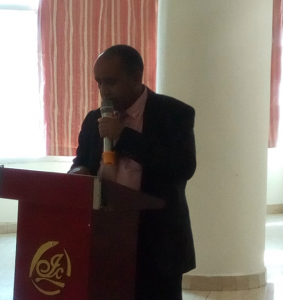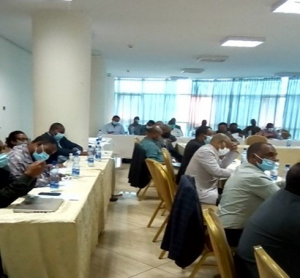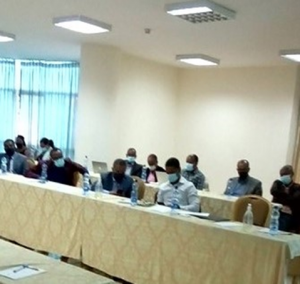On June 11, 2021, the Global Green Growth Institute (GGGI) Ethiopia office convened a half-day inception workshop of the Forest Finance & Investment Incubator (FFII) Ethiopia project at Inter-Bistro Hotel in the capital, Addis Ababa. A total of 39 participants, including high-level government officials, and a range of stakeholder institutions attended the workshop.
The FFII Ethiopia project is part of a global program implemented in 5 countries through a three-year cooperative agreement by and between the U.S. Department of State (“DOS”) Bureau of Oceans and International Environmental and Scientific Affairs and Conservation International (“CI”), in partnership with core implementation partner, the Global Green Growth Institute (“GGGI”). The primary goal of the program is to catalyze private sector financing of national and sub-national climate strategies in the forestry, agriculture, and land-use sectors.
The FFII encompasses three (3) distinct but interrelated stages where Stage 1 focused on the identification of gaps in green growth policies that constrain investment while in Stage 2, on the basis of stage 1 findings, Investment Plans will be designed for National and Sub-National Climate Strategies. The third Stage 3 will focus on securing financial commitments and funding to implement pipeline investments.
The objective of the workshop was to establish multi-stakeholder working groups (MSWGs) that will review the Finance & Investment Plan (FIP) antecedent conditions identified in Stage 1 and also provide strategic and technical support/guidance in FFII project implementation.
The workshop brought together stakeholders drawn from the public and private sectors, development partners, bilateral and multilateral organizations and financial institutions, relevant NGOs/CSOs, and research institutions.
The inception workshop was officially opened by H.E Ato Kebede Yimam, Deputy Commissioner for the Forest Sector, the Federal Environment, Forest & Climate Change Commission.

In his opening remark, the deputy commissioner highlighted Ethiopia’s climate policies, strategies and plans; collaborative efforts the government undertaken to reduce deforestation and forest degradation along with large scale afforestation/reforestation programs; the encouraging results so far and also the challenges therein to achieve Ethiopia’s national green-house gas (GHG) emission reduction targets.
‘Ethiopia’s updated Nationally Determined Contribution (NDC) set the national GHG emission reduction targets (by 2030) which the country can achieve with its own resources (unconditional) and GHG reductions targets achievable with the international support (Conditional)’ he noted.
He added that ‘there is a huge gap between targets set for green economic development and investment needed to achieve these goals’. Accordingly, he urged the need for mobilizing investments through the creation of enabling conditions to leverage private finance (domestic and foreign) that can contribute to Ethiopia’s climate policies and strategies and achieve GHG emission reduction goals and improve local livelihoods.
The deputy commissioner pointed out that the objective of the FFII project in general and the identified potential investment opportunities, are well-aligned with the national climate strategies and economic development goals. In concluding his opening remark, Ato Kebede stressed the importance of an inclusive and participatory process in FFII project implementation and the crucial role the MSWGs would play in providing strategic and technical guidance for the successful development of bankable investment plans.
Following the opening remark, Dr. Gemedo Dalle, GGGI Country Representative, took the stage and highlighted GGGI’s core areas of engagement in supporting countries for a green growth economic transition. He stressed Ethiopia’s huge dependency on biomass energy and the potential business opportunity of developing the forest sector in this regard. However, he noted, private sector engagement in forestry is little or insignificant. The FFII project, he added, is one of the recently initiated GGGI country projects that contribute to the government of Ethiopia’s plan to green economy transition. He then invited Dr. Solomon Zewdie, FFII project country lead, to give a short presentation on FFII project overview and status.


FFII Ethiopia project: overview and status
In his presentation, Dr. Solomon provided a general overview of the FFII project scope, goal/objectives, implementation stages and status. He noted that Stage 1 of the project (completed in December 2020) evaluated Ethiopia’s climate change-related policies, strategies and plans; assessed the enabling conditions (existing legal and policy incentives) that incentivize private investment in selected potential investment areas (timber, bamboo, coffee and Honey/beeswax). The assessment findings further revealed the key antecedent conditions in the agriculture, forestry and land use (AFOLU) sectors that need to be addressed for successful mobilization of private finance.
The presentation further outlined FFII work plan and specific activities for Stage 2 and Stage 3. Key Stage 2 activities include: establishment of multi-stakeholder working groups (MSWGs) and review of antecedent conditions; the development of action plans (APs) and finance and investment plans (FIPs) and prioritization of FIPs. Stage 3 will focus on securing finance for implementation of prioritized pipeline investments.
Establishment of multi-stakeholder working groups (MSWGs)
Regarding the establishment of MSWGs, Dr Solomon explained that the constitution of working groups is an integral part of the project implementation approach/strategy. He further noted that stakeholders for working groups (WGs) were carefully identified following mapping and analysis of the influence/interest of relevant stakeholders from different stakeholder groups (public, private, NGOs/CSOs, development partners and research institutions). Accordingly, two WGs were constituted to support/guide the development of APs and FIPs. He added that the MSWG for AP is largely from the public sector while the MSWG for FIP is principally from the private sector although some stakeholders may fall in both groups based on their expertise/role. The presentation further outlined stakeholders’ roles/responsibilities in relation to strategic and/or technical support/guidance they are expected to provide in the development of Aps and FIPs.
Discussions and key feedbacks from stakeholders
Workshop participants have pointed out that the FFII project initiative is well aligned with national and sectoral plans. The project would also create a partnership between the private and public sector and the project creates a wonderful opportunity to mobilize much needed private investment in forestry.
On FIP antecedent conditions and FFII project implementation
While the stakeholders generally acknowledged the validity of the list of antecedent conditions, the following were some of the key comments in reviewing antecedent conditions and enabling environment for private investment in the AFOLU sector.
- While some participants acknowledge availability of land (particularly large tract of productive land as a problem for investment), stakeholders from public sector strongly argued that the absence of a national land-use policy and plan is rather the overarching limiting factor for investment.
- On the other hand, EFCCC’s Deputy Commissioner (Ato Kebede) noted that the commission is finalizing a land use policy and plan and the legal documents are submitted to the Prime Minister’s office.
- It was stressed that FFII’s assessment of the enabling conditions (for private investment) need to consider the full range of incentives indicated in the 2018 Forest Proclamation. Notable ones include provision of forest land free of lease and tax exemption for the first harvest.
- FFII project should also explore experiences/lessons from implementation of big Public-Private Partnerships (PPPs) in other sectors (e.g. Agriculture, infrastructure) in Ethiopia. Moreover, it is good to assess and document the constraints for foreign investment in relation to the banking and other regulatory systems.
- Regarding the absence of sectoral platform, private forest industry actors should work closely with EFCCC. Lessons from the Ethiopian Chamber of Commerce & Sectoral Association is worth considering.
- For better synergy, FFII project need to be aligned with relevant initiatives in the Forest Sector Transformation Unit (FSTU) at EFCCC and the Private Sector (PS) initiative in the Oromia Forested Landscape Program (OFLP) supported by the World Bank.
Way forward
Dr. Solomon presented FFII’s stakeholder engagement plan until December 2021 and reiterated the crucial role that MSWGs play (as noted by H.E. Ato Kebede Y.) in the development of APs and FIPs. The participants agreed for continuing commitment to support the project implementation. To this end, GGGI will continue identifying relevant initiatives for better synergy and alignment. GGGI will also refine the list of antecedent conditions based on the relevant comments provided by the MSWGs. Moreover, GGGI will communicate (in the next few days) workshop participants on their official assignment in MSWGs for AP and/or FIP development.
In closing the half-day workshop, Dr. Gemedo Dalle expressed his heartfelt appreciation of the commitment of workshop participants for attending the workshop and their interest to continuing engagement in FFII project implementation in the months to come.